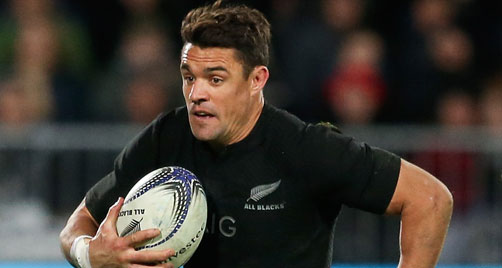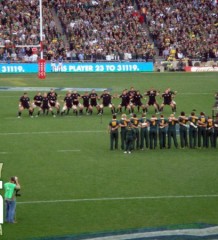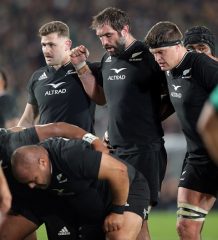2015 All Black retirements – Dan Carter
Measuring the impact of Dan Carter on New Zealand rugby will be something historians of the future assess because apart from all his match-winning qualities, the great gift Carter gave the All Blacks was the example to which prospective five-eighths should aspire.
To head off to France for the last playing days of his career with such an outstanding legacy, forever available through video footage to inspire future generations, is a brilliant asset for New Zealand.
What marked Carter as different was his soundness in all aspects of his game, soundness which produced a confidence to unleash dazzling individual skills in a flash, the greatest quality a five-eighths can bring to the game, whether by running, kicking or tackling.
Carter had them all and there will be many moments that rugby fans regard as their own special memories of Carter’s play, but we list 10 to consider as among his finest.
June 21, 2003, v Wales, Hamilton

The day Dan Carter made his All Blacks debut. He was straight into the action named in the starting XV at second five-eighths. New Zealand had been beaten by England a week earlier 15-13 in Wellington, and the backline was rearranged with Mils Muliaina getting a start at fullback in place of Doug Howlett, who moved to the wing instead of Caleb Ralph. Tana Umaga, who had been a second five-eighths against England, moved out to centre in place of Ma’a Nonu who had played his debut game in the loss. Things soon clicked for New Zealand and with Carter given the goal-kicking duties he was soon in the action, especially in the second half after the All Blacks built on their 17-3 lead to run out 55-3 winners with Carter scoring a try, kicking six conversions and a penalty goal for a personal haul of 20 points.
July 26, 2003, v Australia, Sydney

Coming on as a replacement for Carlos Spencer, Carter played for the first time at first five-eighths for New Zealand. He managed a try and a conversion in the 50-21 victory ahead of the Rugby World Cup.
November 13, 2004, v Italy, Rome

Encounters with a still emerging Italian side might not normally rate as important in the scheme of things but in Carter’s career it was especially significant. Having seen Carlos Spencer and Andrew Mehrtens filling the first five-eighths berth through much of the 2004 season, the first northern tour under the new coaching panel of Graham Henry, Steve Hansen and Wayne Smith resulted in a changing of the guard and Carter was a significant recipient by starting at first five-eighths. He celebrated with a try and conversions of seven of New Zealand’s nine tries.
July 2, 2005, v British and Irish Lions, Wellington

The defining night of Carter’s career. This was when it became apparent that New Zealand had discovered the player who would ultimately be regarded as the finest exponent of the position the game had seen. And it was all on display in his 33-point haul in the 48-18 win. Much emphasis over the years has rightly focused on the two tries he scored, but it shouldn’t be forgotten that he also demonstrated more of his class in setting up the opening try for his skipper Umaga by virtue of a stunning break. As Stuart Barnes, the former England five-eighths said: “I’ve been involved in this game for 30-odd years and I don’t remember a more complete performance from a flyhalf than this from Daniel Carter – kicked majestically, but a dangerous runner, a glorious distributor…It has been a performance of greatness.”
August 26, 2006, v South Africa, Pretoria

Already established as a goal-kicking machine, Carter unleashed one of his more stupendous goals in the heart of Afrikanerdom where they know all about goal-kicking five-eighths. Down 3-11, Carter slipped a kick through the home defences which saw prop Neemia Tialata score, and with a conversion and a penalty goal to Carter, New Zealand looked like going to half-time, 13-11 up. But after the hooter the South Africans were penalised 61m out from their line. Carter was going to kick for touch initially but thought there was nothing to lose and attempted the shot. He struck it perfectly and it crossed the bar with a metre or two to spare. By the time the game finished Carter had 20 points from his boot and New Zealand had a 45-26 win.
November 4, 2006, v England, London

It was meant to be England’s celebration as the game marked the opening of the new South Stand at Twickenham but the All Blacks had other ideas. Having reached a 28-12 lead nearly 55 minutes into the game, the All Blacks halfback Byron Kelleher fielded an England 22m restart just on halfway. He fed flanker Richie McCaw who ran onto the ball at speed. He linked with Carter just past halfway. The five-eighths unleashed a trademark fend to push off an English defender, get through the defensive line and then out-pace the challengers on a run to the line. New Zealand 41-20 and Carter 26 points for the game.
June 19, 2010, v Wales, Dunedin (Carisbrook’s last Test)

Strange as it may seem there were times in Carter’s career when because he wasn’t unleashing his brilliance as often as his critics might like they were calling for him to be left out. As he proved more than once, class is permanent, and at Carisbrook it was Wales who found out. With about 30 minutes remaining, New Zealand led 18-9 when wing Cory Jane came into the backline from the short side to take an in-pass from Carter. Jane ran a pace or two before passing back to Carter who remained in support. He stepped one way and then headed back to his right to beat three defenders en route to the goal-line. Try No.1. Fifteen minutes later he found himself out in the centres and had to pull in a ropey pass just out from New Zealand’s 22m. There was space enough to employ his footwork at top speed and he tied Welsh fullback Lee Byrne inside out and then raced in from nearly 80m out for a Christian Cullen-like try. Try No.2. By the end of the night New Zealand won 42-9 and Carter answered his critics with 27 points.
November 28, 2010, v Wales, Cardiff

This was the night Carter changed the record books by becoming the highest points scorer in Test matches. The record would rebound a little between he and Jonny Wilkinson from England in the next year or so, but Carter had his first taste early in this game with a penalty goal landed from 49metres to open the scoring. By the end of his career he would have set a total of 1598 points from 29 tries, 293 conversions, 281 penalty goals and eight dropped goals.
October 17, 2015, v France, Cardiff (World Cup quarter-final)

Having set about their task of getting their game in place, the All Blacks had used what was regarded by many as a low-key programme of pool games to build their strategy. Fans at home were concerned, especially as they faced France back in Cardiff, in a Cup quarter-final. They needn’t have been concerned. This was the first demonstration of Carter’s desire. It came just before the 30-minute mark when Carter broke on the blindside and utilised an asset in his game that was much less acknowledged than his more obvious kicking and running skills – his fend. French lock Pascal Pape was on the receiving end, as many others have been during Carter’s career. But at the same time, Carter unleashed a backhand flick to wing Julian Savea who capitalised to score a try.
November 1, v Australia, Twickenham (Rugby World Cup final)

For much of Carter’s career, New Zealanders had an aversion to the dropped goal. A legitimate method of scoring, especially against defence-minded opponents, those who kicked, or even attempted, dropped goals were often met with a round of booing by New Zealand crowds. It was difficult to understand why. Some fine exponents had been seen in the New Zealand game over the years. But just as no-one had complained about his timely dropped goal in the semi-final win over South Africa a week earlier, no-one was prepared to criticise with his crucial dropped goal from 41m to take New Zealand to a 24-17 lead with 10 minutes remaining in the World Cup final. It was followed by a thumping penalty goal from halfway – two final acts in a brilliant Test career.

Related Posts
« Ieremia to coach Samoa France name their 30 man squad for the Six Nations »




















